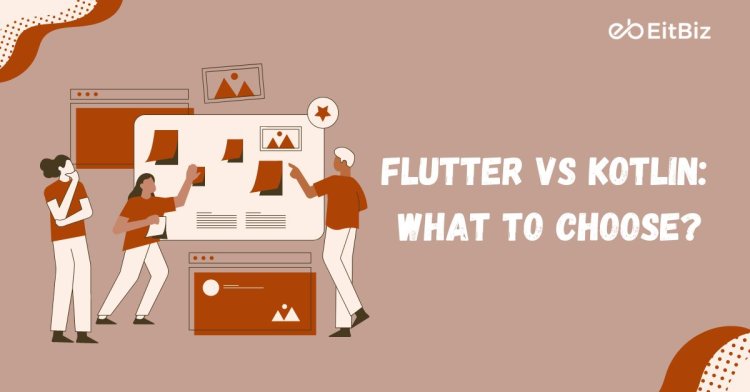Flutter vs Kotlin: What to Choose?
Discover the differences between Flutter and Kotlin for mobile app development. Explore the unique features of each platform to make the right choice.
Share this Post to earn Money ( Upto ₹100 per 1000 Views )

The debate is not new and even our internet is flooded with multiple articles regarding “Flutter vs Kotlin”.
But no specific answer is given to the question, right?
Well, that’s why, you have stumbled upon the post to know the right difference between Flutter & Kotlin.
Both mobile app development frameworks are incredibly popular when it comes to building scalable, responsive, and feature-rich apps.
But as a rule of thumb, you cannot walk on two boats at a time. Thus, it is important to choose the right one for your app development project.
In this post, we’ll discuss the ins and outs of Flutter vs. Kotlin to ensure you’ll make the right decision.
Let’s dive in!
Understanding Flutter: What is it?
Introduced by Google, Flutter is a popular cross-platform app development framework that enables developers to build solid and scalable mobile/web applications across various platforms. Backed by the Dart programming language, the framework enables developers to write code that can easily be compiled into native machine code across different platforms. One of the biggest highlights of Flutter is that it allows for the delivery of high-performance and native-like user experiences.
Speaking of its popularity, Flutter has garnered significant attention in a short span of time. And facts don’t lie!
Important Facts & Statistics Related to Flutter
Let’s take a look at some of the promising facts related to Flutter.
• Over 2 million developers have already utilized Flutter in 2023, and 500,000 of them use it every month.
• Approximately 85% of Flutter developers simultaneously create applications for several platforms.
• Approximately 90% of Flutter developers think that the framework enhances user functionality.
What are the Features & Benefits of Flutter?
Here is a list of the key features and benefits of Flutter.
- Cross-Platform development
One of the key features and benefits of Flutter is that it facilitates cross-platform development, which allows apps to be developed for both the iOS and Android platforms using a single codebase. Because developers don't have to build unique code for every platform, this saves time and effort.
- Hot Reload
Another major feature and benefit of Flutter offers a hot reload functionality, which developers can update code in real-time and iterate more quickly.
- Graphic Interface
Flutter, which is based on the Dart Programming Language, helps build a mobile app with a description of the graphic interface. Along with images, typefaces, and other elements, the work's outcomes are included in the native program.
Apps based on Flutter
Here’s the list of the most popular apps that are built using Flutter:
- Google Ads.
- KlasterMe.
- Reflectly.
- Take Your Seat.
- Xianyu by Alibaba.
- Lunching.
- Pairing
- Postmuse.
Understanding Kotlin
Whether you want to build Android apps, server-side apps, and much more, Kotlin is an ideal choice. It is a cross-platform, general-purpose, and open-source programming language that runs on JVM. Backed by Java’s virtual machine (JVM), the framework is compatible with all kinds of browsers, devices, and OS, making it a preferred option among developers of all kinds. The major highlight of the framework is that the apps built using Kotlin or with the help of Kotlin app development company can easily be used wherever Java works: the backend, the web, the desktop, and much more.
Some Quick Facts Related to Kotlin
- A growing percentage—more than 10%—use Kotlin for mobile multiplatform development.
- With a market share of 1.75% in 2024, Kotlin is ranked 13th on the PYPL ranking.
What are the Features and Benefits of Kotlin?
- Native Performance
One of the biggest features and benefits of Kotlin is that it builds apps specifically for Android. This means that apps developed with Kotlin can achieve native performance on their respective platforms. Compared to cross-platform frameworks like Flutter, this can result in faster and more efficient apps.
- Platform-specific APIs
Kotlin provides direct access to platform-specific APIs, which means developers can leverage the full capabilities of the underlying operating systems.
- Mature Ecosystem
As compared to other frameworks available, Kotlin has been around for a longer time. There is no arguing with the fact that it has now earned a vast range of libraries, tools, and resources that help in the development. Developers can easily find solutions and address challenges, thanks to the extensive support.
Apps based on Kotlin
Here is the list of the apps built using Kotlin.
- Postmates
- Corda
- Coursera
- Evernote
- Uber
Comparison Between Flutter vs. Kotlin: Know the Right Decision
Final Thoughts
So, there you have it! Whether you are building a web app or a dedicated mobile app, Flutter and Kotlin are two of the popular frameworks to consider. But if you want to build an app that saves time and has built-in features, Flutter is an ideal choice! It offers a rapid development cycle, a single codebase for multiple platforms, and a rich set of pre-designed widgets. On the other hand, if you want to build a native Android app then Kotlin is a better choice.
Not sure what to choose for your development project? Partner with EitBiz, a leading flutter app development company, and Kotlin app development company to kickstart your app development journey. Contact us EitBiz at +1 (812)530-6300 or mail us at info@eitbiz.com to build a solid app today.








![Sugar Defender Experiences - [ SALE AVAILABLE ] The Silent Killer: Understanding the Dangers of Sugar Addiction](https://blog.rackons.in/uploads/images/202407/image_380x226_669784da70594.jpg)
